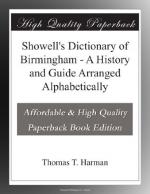Parliamentary Elections.—Notwithstanding the safeguards provided by the Ballot Act, and all the deterrent measures enacted against bribery and intimidation, and those peculiar tactics known as “getting up steam,” the period of an election for Parliamentary representatives is a time of great excitement even in these days. But it is comparatively naught to what it used to be, when the art of kidnapping Tory voters, or “bottling” Whigs, was considered as only a small part of the education required by aspiring political agents. Leading burly prizefighters to clear the hustings on nomination day, upsetting carriages containing voters going to poll, and such like practical jokes were all en regle, and as such “goings-on” were to be found as much on the one side as the other, neither party’s pot had a right to call the opponent’s kettle black. Prior to the enfranchisement of the borough, one of the most exciting elections in which the Brums had been engaged was that for the county of Warwick in 1774, when Sir Charles Holte, of Aston Hall, was returned. The nomination took place Oct. 13, the candidates being Mr. Shipworth (a previous member), Mr. (afterwards Lord) Mordaunt, and Sir Charles, who for once pleased the Birmingham folks by calling himself an “Independent.” The polling, which commenced on the 20th, was continued for ten days, closing on the 31st, and as Mr. Mordaunt had the lead for many days the excitement was intense, and the rejoicings proportionate at the end when the local candidate came in with flying colours. The voting ran:—Shipwith, 2,954; Holte, 1,845; Mordaunt, 1,787.—A Birmingham man was a candidate at the next great county contest, forty-six years after. This was Mr. Richard Spooner, then (1820) a young man and of rather Radical tendencies. His opponent, Mr. Francis Lawley, was of the old-fashioned Whig party, and the treatment his supporters received at the hands of the Birmingham and Coventry people was disgraceful. Hundreds of special constables had to be sworn in at Warwick during the fourteen days’ polling, business being suspended for days together, but Radical Richard’s roughs failed to influence the election, as Mr. Lawley obtained 2,153 votes against Mr. Spooner’s 970. As Mr. Spooner grew older he became more prominent in commercial circles, and was peculiarly au fait in all currency matters, but he lost his hold on local electors by turning to the Conservative side of politics. Of this he was more than once reminded in after years, when speaking in the Town Hall, by individuals taking off their coats, turning them inside out, and having put them on again, standing prominently in front of “Yellow Dick” as they then called him.




